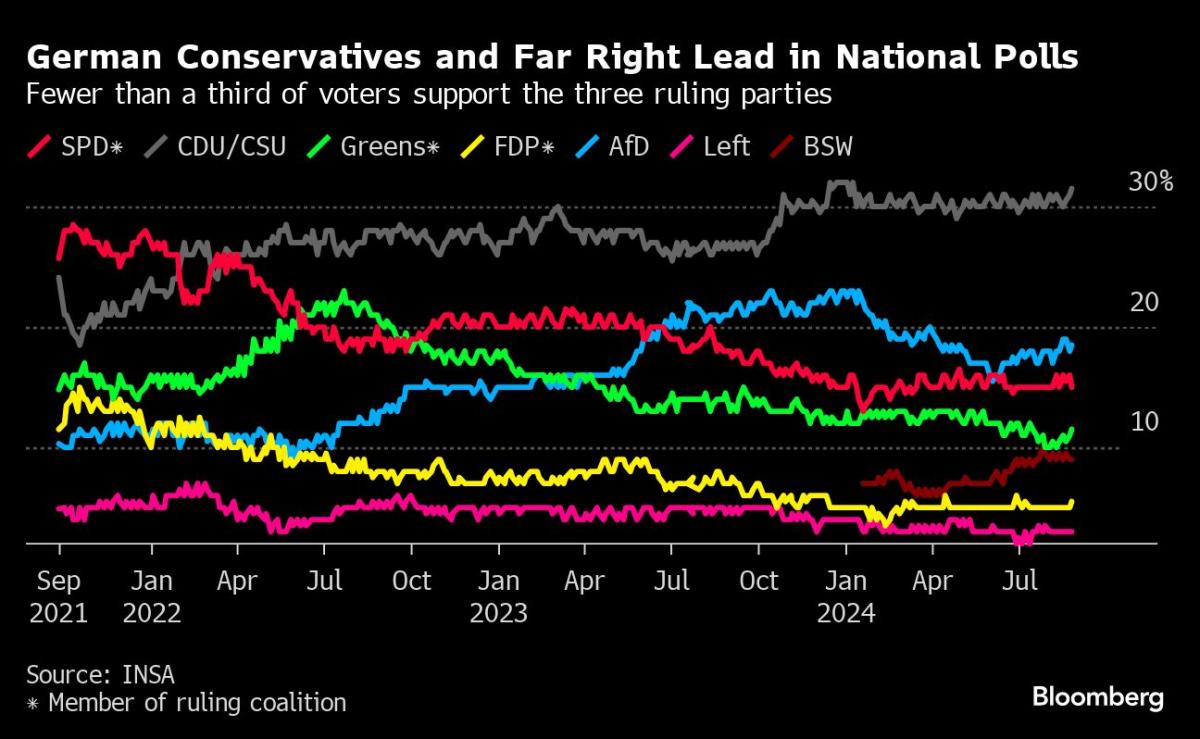(Bloomberg) — A firewall erected to keep the Alternative for Germany from power appeared to be holding even after the far-right party won Sunday’s regional election in Thuringia and came a close second in neighboring Saxony.
Most Read from Bloomberg
The AfD, classified by security services as right-wing extremist in both states, took 32.8% of the vote in Thuringia, according to preliminary results. It was the first triumph for a far-right party in a German state ballot since World War II.
The other parties in the regional parliament have said they won’t join a coalition with the AfD, meaning the second-placed Christian Democrats — who won in Saxony — are most likely to lead the next administration in the state capital Erfurt.
The outcome of the elections in the two eastern German states represented another humbling for Chancellor Olaf Scholz’s Social Democrats and his two partners in the deeply unpopular ruling coalition in Berlin — the Greens and the Free Democrats.
With just over a year until the next scheduled national election, they got less than 15% between them in each of the two states. The FDP was nowhere near the 5% threshold for getting into either regional parliament and the Greens fell short in Thuringia.
The ruling coalition has failed to “generate trust among people and, above all, confidence that we can implement what we promise,” Saskia Esken, a co-leader of Scholz’s SPD, said in an interview with public broadcaster Phoenix. “That’s why we have to campaign even more, explain things, and get out there.”
With Germany’s economy stagnating and migration a key concern among voters, nationwide support for the three ruling parties has slumped to record lows. Populist parties of the extreme right and left took more than 60% of the vote in Thuringia and almost half in Saxony, highlighting the crumbling of Germany’s political center in some parts of the country.
National backing for the conservative CDU/CSU alliance is on around 32% — roughly the same as the SPD, Greens and FDP combined — and the AfD is in second place on about 18%.
The battering for the ruling parties prompted fresh claims from opposition parties that the government is a spent force, as well as renewed calls for the next election to be brought forward. It may also fuel debate about whether Scholz should be the Social Democrat chancellor candidate.
With the government in dire straits, optimism that Germany would rebound in 2024 from two years of almost zero growth has faded. An anticipated jump in consumer spending failed to materialize and the country’s industrial sector continues to struggle.
Bickering within the ruling coalition over how to tackle the challenges facing the world’s third-largest economy, apparently without being able to offer effective solutions, has fueled frustration with the three governing parties.
They’re likely to suffer another drubbing in a state ballot in three weeks in Brandenburg — the region that surrounds the capital Berlin and is home to Scholz’s Potsdam constituency.
The CDU’s solid performance Sunday could feed into their decision on a conservative chancellor candidate. The party leader, Friedrich Merz, seems likely to secure the nomination and received backing from the CDU premier of Hesse, Boris Rhein.
“The CDU is very strong in Saxony and constructive politics is also not possible in Thuringia without us,” Rhein was quoted as saying Monday by the Funke media group. “This is clearly also a success for our federal chairman Friedrich Merz.”
A number of other hopefuls can’t yet be ruled out, including North Rhine-Westphalia Premier Hendrik Wuest and Bavaria Premier Markus Soeder, who leads the Christian Social Union, the CDU’s sister party in the southern region.
Merz has said the CDU and CSU will decide on their joint candidate after the Brandenburg vote. The final state election before the next national ballot is at the beginning of March in Hamburg, the port city where Scholz used to be mayor and his SPD rules in coalition with the Greens.
In Sunday’s elections, a new far-left party, the Buendnis Sahra Wagenknecht, won 15.8% in Thuringia and 11.8% in Saxony, according to preliminary results.
Founded only in January after Wagenknecht split from the Left party, it’s likely to play a key role in keeping the AfD out of power in Thuringia. Like the far-right party, the BSW wants to curb immigration and stop aid to Ukraine.
With little prospect of the AfD winning power at the national level anytime soon, impact should be limited from the state votes on financial markets, which were unsettled by the recent rise in popularity of French fringe parties. Germany’s DAX index hit a record high last week, topping its previous peak of May 15.
–With assistance from Arne Delfs and Michael Nienaber.
Most Read from Bloomberg Businessweek
©2024 Bloomberg L.P.

